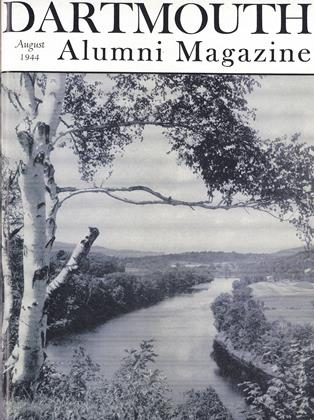The following is part of the daily column, "White Collar Girl," which appeared in the Chicago Daily Tribune of July 10, 1944, written by Ruth MacKay, wife of Donald H. C. MacKay '20, secretary of the Dartmouth Alumni Association of Chicago.
HANOVER, N. H.—This is a man's town. But there are women here who have watched the students come and go like the leaves of spring drifting away in the autumn.
There is Mary Smalley. She no longer is in business on College Street where for so long she ran her famous eating club, begun in 1914 with 12 members, later enlarged to feed 150.
It's been a wonderful life, she says. The eating club provided her with a good living for a sick husband and two children. It gave her a close touch with youth. She says, "I loved every bit of it—the deviltry, the fun, the good and the bad, the ups and downs—every bit of it!"
She lives quietly now, surrounded by gifts of the students: a~ beautiful silver platter from "The Charter Members of the Smalley Club," a silver bread tray, a lovely tip table, and a cake platter inscribed "To Mrs. Smalley from the Bankers." The bankers were a group who ate in the kitchen to save money and so named themselves because "they had the best of everything and paid the least."
She has a Deke pin, a Dragon pin, and a beer mug presented by her boys. She remembers them all, hundreds of them, never forgets a name, a face or a prank: Gene Markey and Dr. Syvertsen [now secretary of the medical school] and Bill Embree cake-walking before a tray of fried chicken at a dinner where she catered. She remembers affectionately her "managers" who took charge of the business. She saw them all, gay, lonesome, homesick, in trouble. She sent a rider on horseback into the snow covered hills to an outing club cabin to reach a student whose mother was dying; she bought railroad tickets, lent money "and never lost a penny"; she interceded for the miscreants with the president of the college; she rescued some boys from drowning. She remembers them all.
She calls long distance now for word of the boys in the invasion, "other mothers' sons, but sons of Dartmouth." "I cannot tell you how I feel," she says simply. As she waits for news only one thing sustains her. It was Mary Smalley who put up the flags when college opened after the last war. Some day, some day, the flags will go up again.
 View Full Issue
View Full Issue
More From This Issue
-
 Article
ArticleA TEACHING LIBRARY
August 1944 By NORMAN K. ARNOLD -
 Article
ArticleTHE HISTORIC COLLEGE
August 1944 -
 Article
ArticleALUMNI OFFICERS MEET
August 1944 -
 Article
ArticleTHE 50-YEAR MESSAGE
August 1944 By REV. CHARLES C. MERRILL '94 -
 Class Notes
Class Notes1904
August 1944 By DAVID S. AUSTIN II, THOMAS W. STREETER -
 Article
ArticleMAN WITH COW SENSE
August 1944 By A. P.
Article
-
 Article
ArticleGrantland Rice Sportlight Features DOC Activities
October 1950 -
 Article
ArticleSamson Occom Scholars
FEBRUARY 1973 -
 Article
ArticleA Kind of Leaven
DECEMBER 1982 -
 Article
ArticlePretty green
OCTOBER • 1987 -
 Article
ArticleDartmouth 30, Pennsylvania 0
November 1961 By DAVE ORR '57 -
 Article
Article63 Students Have Cars
JUNE, 1928 By James P. Richardson

